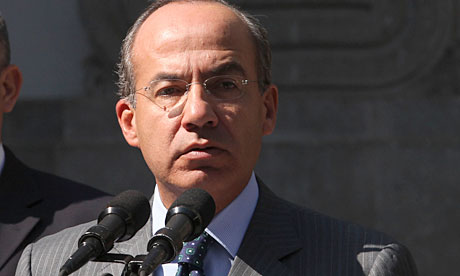US has lost faith in Mexico’s ability to win drugs war, WikiLeaks cables show
- By Rory Carroll, Latin America correspondent
- guardian.co.uk, Thursday 2 December 2010
WikiLeaks cables are a bleak contrast to Mexican insistence that the state is prevailing in the drugs war declared by President Felipe Calderón in 2006. Photograph: Alexandre Meneghini/AP
The US has lost confidence in the Mexican army’s ability to win the country’s drugs war, branding it slow, clumsy and no match for “sophisticated” narco-traffickers.
Classified diplomatic cables released by WikiLeaks also reveal a growing sense of alarm within Mexico‘s government that time is running out in the battle against organised crime and that it could “lose” entire regions.
The memos detail blunders in the fight against drug cartels and a desperate search for a new strategy to save President Felipe Calderón’s administration from a bloodsoaked fiasco.
The assessments, made in a cable to Washington earlier this year, are bleak contrast to Mexican insistence that the state is prevailing in a war declared by Calderón in 2006. Four years later drug-related violence has killed more than 28,000 people and brought cities such as Ciudad Juárez and Tijuana to the brink of anarchy, with mayors, police chiefs and ordinary people gunned down with impunity and beheadings shockingly common.
Geronimo Gutierrez Fernandez, the undersecretary for governance, told US diplomats that “pervasive, debilitating fear” had infected even relatively safe parts of the country. “He expressed a real concern with ‘losing’ certain regions.”
US diplomats painted a scathing picture of Mexico’s armed forces, singling out the army as bureaucratic, parochial, outdated and unfit to combat drug trafficking organisations (DTOs).
“Mexican security institutions are often locked in a zero-sum competition in which one agency’s success is viewed as another’s failure, information is closely guarded, and joint operations are all but unheard of. Official corruption is widespread, leading to a compartmentalized siege mentality among ‘clean’ law enforcement leaders and their lieutenants.”
The cable laments that only 2% of those detained for organised crime-related offences were brought to trial and said the army was “incapable” of processing information and evidence for judicial cases. “It has taken a serious beating on human rights issues from international and domestic human rights organizations, who argue with considerable basis, in fact that the military is ill-equipped for a domestic policing role.”
It was a stinging verdict on the decision of Calderón, a White House ally, to deploy tens of thousands of troops, especially in Ciudad Juárez where narcos ran rings around them.
“The DTOs are sophisticated players: they can wait out a military deployment; they have an almost unlimited human resource pool to draw from in the marginalised neighborhoods; and they can fan complaints about human rights violations to undermine any progress the military might make with hearts and minds.”
The diplomats also criticised the “dysfunctionally low level of collaboration” between Mexican military and civilian authorities along the border.
They praised Mexico’s navy as a nimbler force which took down the drug lord Arturo Beltrán Leyva but even that risked a downside of making the army, the navy’s institutional rival, more defensive and risk-averse.
The classified cables reveal the depth of US concern about its neighbour and partly explain why in September Hillary Clinton compared Mexico to insurgency-plagued 1980s Colombia and floated the possibility of US troops intervening. Mexican officials indignantly rejected the secretary of state’s comments.
Privately, Gutierrez Fernandez admitted to US officials that Mexico bungled the early phase of the Mérida Initiative, a security pact between the US, Mexico and central America, by focusing too much on equipment rather than competent personnel and institutions.
“Gutierrez went on to say, however, that he now realizes there is not even time for the institution building to take hold in the remaining years of the Calderon administration.” If there was no tangible success within 18 months the next government would have difficulty sustaining the drugs war, said the minister.
Gutierrez and Jorge Tello Péon, the national security system coordinator, said despite setbacks Mexico would “stay the course” and asked the Americans to aid a new strategy focusing on the most violent cities.
“If we could turn around Tijuana, Ciudad Juárez, and one other city such as Culiacán, it would solve 60% of the violence, and send a signal to the Mexican people that the war can be won,” reported the cable. It urged Washington to back the strategy.
The US diplomats noted that Mexico’s president had recognised the failure of army deployments and replaced troops with federal police. “Calderón has openly admitted to having a tough year … and contacts have told (political officers) that he has seemed ‘down’ in meetings.”
Last month, in an interview with the BBC, Calderón insisted that as long as the US remained the biggest consumer of drugs in the world, the terror wrought by the drug cartels in Mexico would continue.
“They [the Americans] have a clear responsibility in this because they are providing the market for the drug dealers and the criminals,” President Calderón said. “They need to do a lot more in terms of reducing the consumption of drugs and to stop the flow of weapons towards Mexico.
